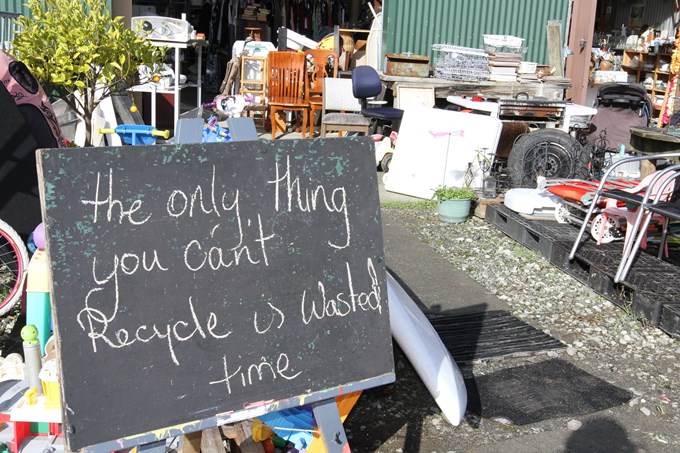Fifty-one community organisations and businesses are receiving a boost in funding from Auckland Council’s Waste Minimisation Innovation Fund (WMIF).
Collectively, grant recipients will receive $649,256 for a range of projects designed to promote waste minimisation and reduce waste going to landfill.
These waste minimisation activities are funded through the waste levy.
- 24 medium and large grant applications (up to $50,000) are supported for a total value of $575,791.
- 27 small grant applications (under $5000) from schools and community groups are receiving a total of $73,465.
Councillor Richard Hills, chair of the Environment and Climate Change Committee, says:
“Thank you to all of our applicants that are shifting us away from a take-make-waste economic model, and are creating new jobs, and supporting the development of a circular economy.
“Fostering new ideas and building community capacity for waste minimisation helps Aucklanders have access to the information, education and support they need to reduce the amount of waste they send to landfill. The aim is to create enduring change in community behaviour and attitudes towards waste.”
Responding to the Climate Emergency
Te Tāruke-ā-Tāwhiri: Auckland's Climate Plan sets out a path for the region to achieve its climate goals and respond to our changing climate. Projects funded through WMIF will contribute to key actions in the climate plan.
Develop and support initiatives to minimise construction and demolition waste
Construction and demolition waste is the largest source of materials to landfill.
“A typical new house build might waste an average of 4.5 tonnes of materials. This is the equivalent of 30 years of weekly kerbside refuse collections for one person in Auckland,” shares Councillor Hills.
“Keeping construction materials out of landfill and moving them into the circular economy is a priority for Auckland Council projects.”
Five large projects focus on minimising construction and demolition waste. The projects will develop tools and guidelines for the wider construction industry including a better understanding of barriers and opportunities for waste minimisation. Together, they will drive demand for recovered materials by diverting them from landfill or cleanfill, helping to create a circular economy.
Manage our resources to deliver a zero waste, circular economy
Three large projects contribute to a circular economy by encouraging re-use and restoration of products and materials. For example, The Ara Education Charitable Trust received funding to train students at a deconstruction hub. They will renovate state houses that can then be re-sold instead of demolished and sent to landfill.
Resource recovery projects reduce emissions and preserve embedded carbon by extending the lifecycle of the materials they recover. Development of a regional resource recovery network is a priority for Auckland’s long-term aim to achieve zero waste by 2040.
Recovering useful materials instead of sending them to landfill also provides local business and employment opportunities.
Prevent and reduce waste and maximise the value of surplus food
Fourteen major projects that rescue food and divert food scraps from landfill received funding in this grant round. Food scraps and organic materials release methane when they degrade in a landfill. Food waste is almost half the weight of household rubbish. The diversion of food waste will further reduce methane emissions.
Projects from Matakana down to Papatoetoe are setting up community composting hubs to help businesses and households manage their food waste. The Piritahi Marae Trust on Waiheke Island is getting funding to help whānau and nearby businesses compost. Schools are continuing to get on board with food waste minimisation, and small grants are helping them maintain and expand this infrastructure.
“It’s encouraging to learn about the common actions so many different groups are doing to reduce the amount of waste they send to landfill. The zero-waste vision is clear from playcentres to youth groups, business associations to construction experts, and marae and community organisations,” says Parul Sood, General Manager Waste Solutions. “The enthusiasm showcases how much Aucklanders care about their environment and how committed they are to preserving it for future generations.”
The full list of recipients is available here on Auckland Council's website.
How WMIF is funded
The Waste Minimisation and Innovation Fund was established to support waste minimisation initiatives using a portion of the funds allocated to Auckland Council from the national waste levy. It is primarily intended to provide seed-funding to encourage and enable creative reuse and recovery and generate economic opportunities.
The Waste Management and Minimisation Plan 2020 sets out the purpose of the fund, which is summarised as follows:
- promote or achieve waste management and minimisation
- reduce waste to landfill in accordance with the objectives of the plan
- foster new ideas and encourage community participation in reducing waste to landfill.
The fund aims to target priority waste streams, reduce harm to the environment and improve efficiency of resource use by supporting new initiatives which complement and enhance existing programmes or address gaps.
A minimum 50 per cent contribution towards the projects is required from applicants. This can be achieved through additional funding from their own or other resources, or time-in-kind. Private investment and funding from other providers are encouraged and considered favourably by the assessment team.


